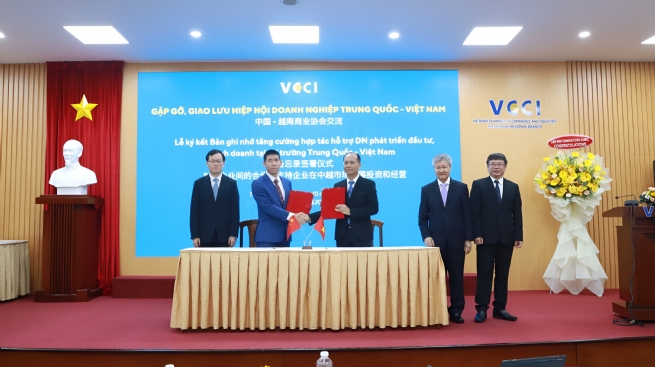Expanding High-Quality Investment Cooperation between Vietnam and China
As Vietnam-China economic ties deepen, high-quality investment is a priority. Vietnam Chamber of Commerce and Industry (VCCI) has fostered agreements with Chinese trade organizations, linking businesses in high-tech, green economy, and technology transfer to promote sustainable investment relations. Mr. Nguyen Quang Vinh, VCCI Vice President, shares his views on this matter.

Mr. Nguyen Quang Vinh, VCCI Vice President
VCCI has signed 45 cooperation agreements with Chinese trade promotion organizations. What specific benefits do these bring to both business communities?
Over the past three decades, VCCI has built an increasingly extensive network of cooperation with Chinese trade promotion organizations, demonstrated by the signing of 45 memoranda of understanding and cooperation agreements. This collaboration involves not only central agencies such as the China Council for the Promotion of International Trade (CCPIT) but also extends to local governments, commerce departments, and chambers of commerce across numerous Chinese provinces and cities, including strategically important regions such as Guangdong, Yunnan, Guangxi, Zhejiang, and Hainan.
In 2024 alone, VCCI welcomed delegations from the CCPIT of Sichuan, Chongqing, Yunnan, Dalian, Guangzhou, Fujian, and Shandong to Vietnam. In addition, VCCI maintains close contact with the Chinese Embassy in Vietnam, the Vietnamese Consulates General in China, and the Chinese Business Association in Vietnam, all with the goal of strengthening bilateral economic and trade cooperation.
The signing of these 45 memoranda and agreements has delivered numerous tangible benefits to enterprises from both countries. They provide a crucial foundation for establishing dialogue channels, sharing information, and supporting business connections, allowing Vietnamese and Chinese enterprises to access each other’s markets more efficiently.
Through this cooperation, numerous forums, trade fairs, seminars, and business-matching programs have been organized, creating favorable conditions for companies to find partners, expand investment cooperation, and develop import and export opportunities. Furthermore, maintaining ties with local-level organizations has enabled businesses to penetrate specific regions more effectively, seize incentives and suitable investment opportunities, build trust within both business communities, and establish a solid foundation for bilateral economic relations amid deepening regional integration.
With Vietnam focusing on high-quality and green investment, how do you see Chinese capital moving into high-tech and clean industries?
Expanding high-quality investment cooperation with China is one of Vietnam’s key directions in pursuing sustainable economic development and international integration. In recent years, beyond traditional trade promotion activities, Vietnam has placed special emphasis on attracting Chinese investment in high technology, supporting industries, renewable energy, and the green economy. These areas align with Vietnam’s strategy to transform its growth model toward innovation and sustainability.
A notable example is a 700-ha Vietnam-China high-tech park in Quang Ninh, set to attract investment in chips, smart devices, automation, and new materials, creating 30,000 jobs and boosting exports. In renewable energy, China Power is working with Vietnamese partners on 500 MW of solar projects to support emission reduction goals.
Compared to the past, when Chinese investment focused primarily on mining, assembly, or low-tech industries, the current clear shift toward high technology and environmentally friendly sectors is producing more positive results. According to Ministry of Finance data, in 2024 Chinese direct investment in Vietnam reached approximately US$2.84 billion, with many projects concentrated in high-tech and green industries. This demonstrates a significant improvement in investment quality.
Beyond individual projects, Vietnam and China have also advanced joint programs in scientific research, technology transfer, and the training of high-quality human resources in areas such as artificial intelligence, smart logistics, and smart cities.

VCCI-HCM hosts Vietnam-China business networking event to boost investment and trade cooperation, October 2024
What benefits have these projects brought to Vietnamese enterprises, and how can investment quality and sustainability be improved?
Strengthening investment cooperation between Vietnam and China, especially in high tech, renewable energy, and supporting industries, has initially brought positive results for Vietnamese enterprises. Many large-scale projects have contributed to production capacity, technology transfer, and job creation, thereby driving sustainable economic growth. However, for such cooperation to deliver long-term effectiveness, comprehensive and sector-specific solutions are required.
Overall, it is crucial to improve the quality of screening and selecting Chinese investors, prioritizing enterprises with financial strength, technological capacity, and long-term commitment. At the same time, strict monitoring mechanisms on environmental protection, labor standards, and technology transfer should be established to ensure sustainability and avoid negative impacts. Vietnam also needs to refine a transparent, stable system of investment incentives to create a competitive business environment, while strengthening the intermediary role of organizations like VCCI and CCPIT in connecting, sharing information, and organizing specialized investment forums.
In high technology, Vietnam should intensify cooperation with Chinese enterprises in chip manufacturing, smart electronics, artificial intelligence, and automation. This requires boosting joint research-training programs and encouraging technology transfer through institute-business partnerships.
In renewable energy, investment projects must ensure the use of clean, high-efficiency technologies, comprehensive environmental impact assessments, and alignment with the national energy strategy. Solar and wind power projects can be expanded if supported by flexible and stable electricity purchase mechanisms.
For supporting industries, attracting projects in component manufacturing, auxiliary equipment, and new materials from Chinese enterprises will help increase localization rates and enhance self-reliance in Vietnam’s processing-manufacturing sector. Specialized industrial zones should be developed to absorb these capital flows, combined with policies to support domestic enterprises in technological upgrading.
For Vietnam-China investment cooperation to truly deliver high added value and sustainability, strategic vision, synchronized policies, and effective coordination between the State, enterprises, and trade promotion organizations are required. Only then will Chinese capital not just be a financial resource, but also a vital driver to help Vietnam shift its growth model toward a green, digital, and innovation-driven economy.
How can businesses implement agreements to boost high-quality cooperation in technology, green economy, and sustainability?
The year 2025 is an important occasion for Vietnam and China to look back on their cooperation journey and open new development orientations for the next stage. To effectively implement the agreements and common understandings of senior leaders, the business communities of both countries need to be more proactive and dynamic in promoting practical, equal, and mutually beneficial cooperation.
First, enterprises on both sides should strengthen information exchange and cooperation in priority areas such as high technology, green economy, digital transformation, and sustainable development. Organizing specialized forums, seminars, and business-matching programs will help companies more easily access cooperation opportunities and stay updated on market and technological trends.
Second, a long-term cooperation strategy is needed, focusing not only on short-term interests but also on sustainable development. Enhancing competitiveness, technological innovation, and compliance with environmental and labor standards will enable enterprises to meet the rising demands of international markets while making themselves more attractive to investors.
In addition, greater collaboration in training high-quality human resources, technology transfer, and research and development will generate added value, enhance production and innovation capacity of Vietnamese enterprises, and build a solid foundation for lasting and effective cooperation in the future.
The core feature of current Vietnam-China economic and trade relations is that they are being implemented in line with the vision and guidance of the senior leadership of both countries. This provides concrete benefits to the business communities and serves as a foundation for consolidating long-term, enduring friendship and cooperation between the two nations.
Thank you very much!








